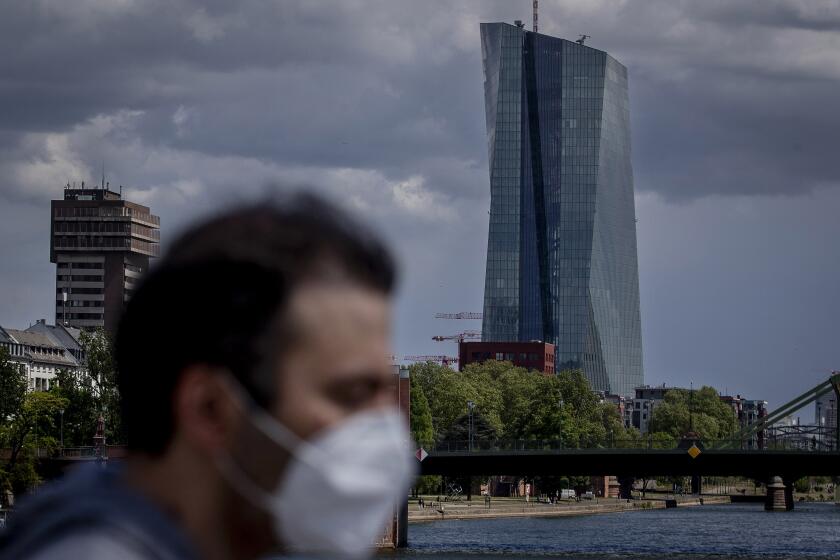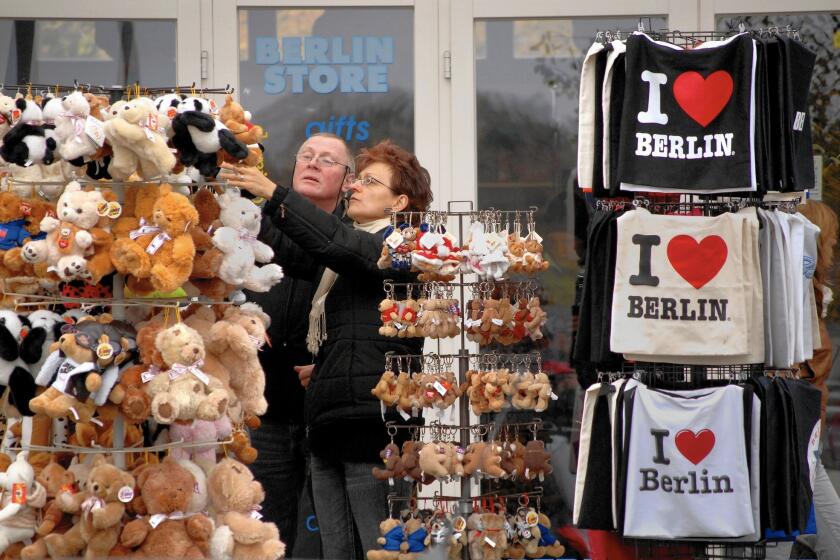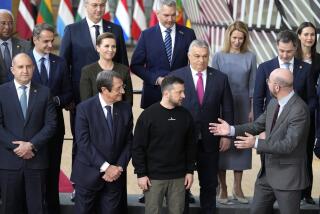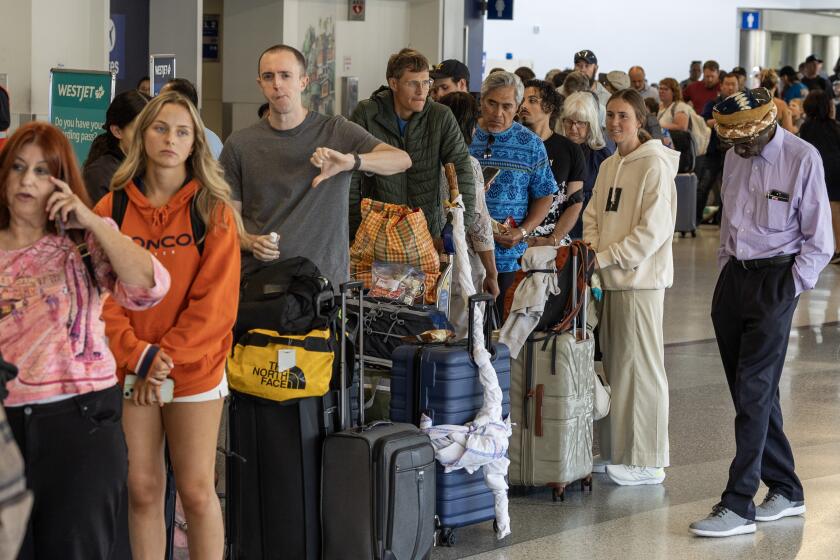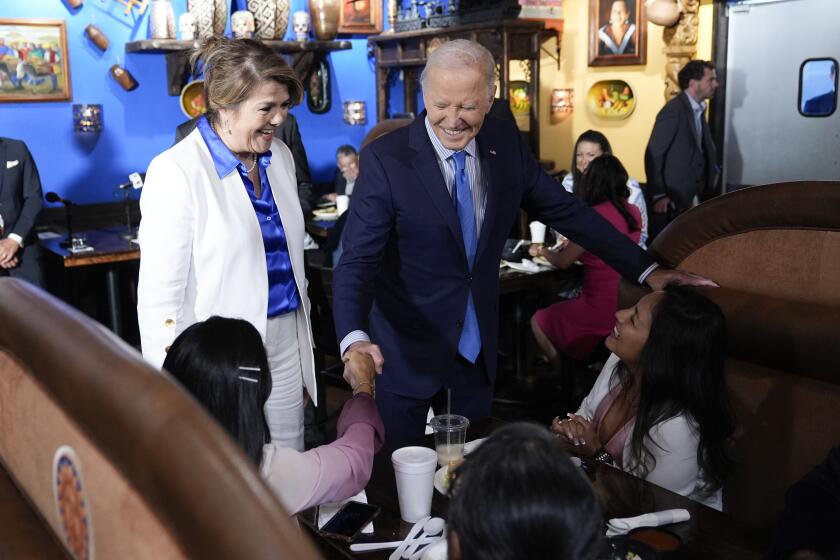EU approves landmark coronavirus recovery fund while U.S. draws new battle lines
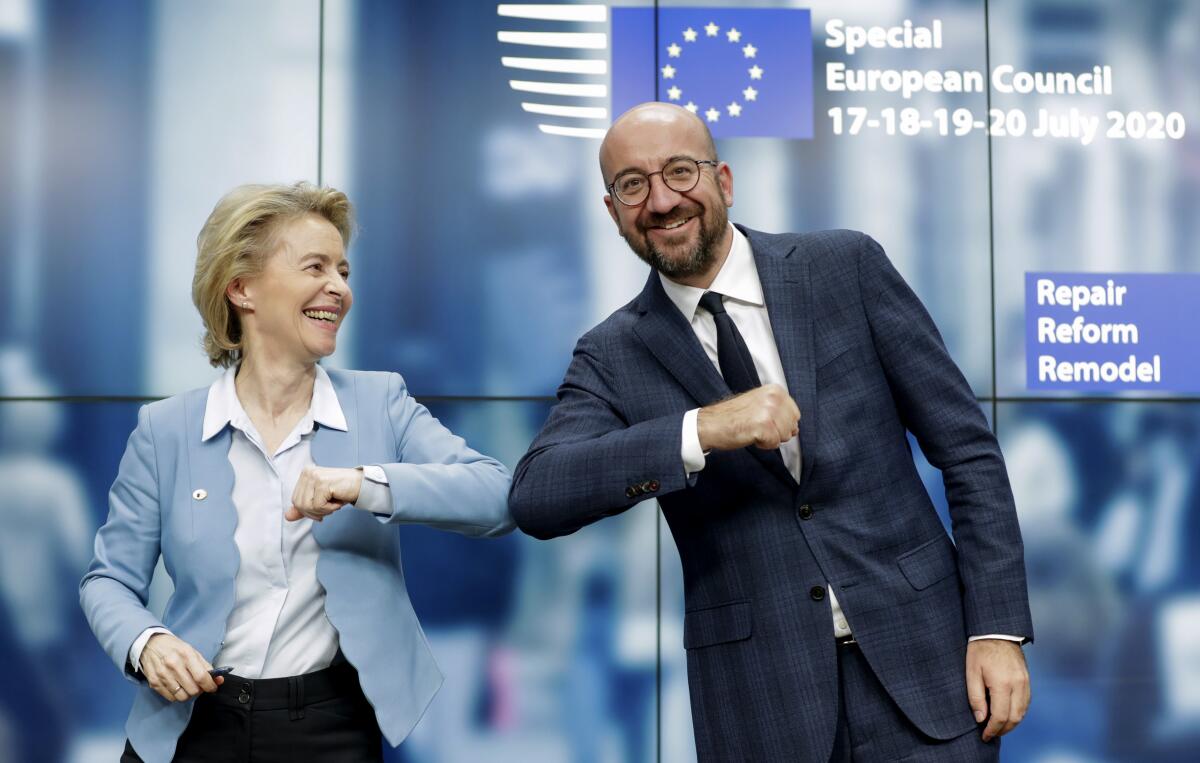
European leaders overcame some enormous political differences to agree Tuesday on a coronavirus-recovery package — a struggle that coincides with a reignited U.S. political battle over how to repair the virus-battered American economy.
At their first face-to-face gathering since the start of the pandemic, the leaders of the 27 European Union member states approved a landmark $859-billion plan to help counter what is shaping up as Europe’s worst financial crisis since World War II. They also agreed on the EU’s overall budget.
Despite some heated rhetoric during marathon day-and-night talks that began Friday, including a table-pounding wee-hours outburst over the weekend by French President Emmanuel Macron, the representatives eventually found common ground by recognizing that the bloc as a whole could not recover unless individual member states were given the tools — and in some cases, the cash — to revive their economies.
The European economy shrank by 3.8% in the first quarter as business activity screeched to a halt in order to slow the spread of the coronavirus.
The United States and the EU, which is made up mainly of wealthy advanced democracies, share many social and economic similarities. But their coronavirus trajectories, initially somewhat comparable, are now very different.
With a combined population of about 450 million, the EU has suffered about 135,000 coronavirus deaths, while the United States, with a population of 330 million, has recorded more than 140,000 fatalities. Early on, several European nations, notably Spain and Italy, amassed devastating death counts, comparable to those in New York at the start of the U.S. outbreak.
However, the EU as a whole has now largely beaten back the virus, with many of the trappings of normal life returning. The United States, by contrast, is inundated by new coronavirus cases and hospitalizations in a huge section of the South and West, including in big population centers such as Texas, Florida and California.
Europe is still experiencing some worrisome flare-ups, like a current outbreak centered in and near the Spanish tourist destination of Barcelona. But the U.S. picture is far darker: Health experts including Dr. Anthony Fauci, the U.S. government’s top infectious-disease specialist, have warned that the new daily cases could reach 100,000 nationwide without a change of course.
The European Union on Tuesday issued a list of 14 countries whose citizens will be allowed back in as visitors, but the U.S. did not make the list.
Against that backdrop, here is a look at some of the main points of contention in the EU coronavirus-economy talks, and how the member states resolved their disagreements:
Who benefits — and under what terms?
Europe — minus Britain, which has formally left the bloc — headed into financial negotiations with a legacy of edgy mistrust between some of the bloc’s biggest economies and its less financially successful states.
During the talks, a group of so-called frugals — Holland, Sweden, Denmark, Austria and Finland — opposed handing over too much money to virus-pummeled countries, and called for greater oversight over funds provided. But the frugals were forced to give ground when German Chancellor Angela Merkel sided with the needy states.
Under the agreed-upon European plan, which still needs ratification by the European Parliament, member countries will raise some of the relief funds by selling bonds collectively. And in another pioneering move, when that money is disbursed, much of it will be in the form of grants, not loans.
The prime beneficiaries will be countries such as Italy and Spain, which were among those hit the hardest by the virus.
Merkel, who has staunchly opposed such an arrangement in the past, was sanguine about the unprecedented new policy, noting the pandemic itself represents uncharted territory.
“Exceptional situations require exceptional measures,” she told a pre-dawn news conference.
In the United States, dramatically differing visions for restoring a virus-devastated economy have been put forth by the Trump administration and the presumptive Democratic presidential nominee, Joe Biden. The House and Senate, pushing up against an August recess, are under the gun to find compromise on what may be the last major coronavirus relief package passed before the November election.
The Swingin’ Hermlins, a German group dedicated to American big band music, vowed to play nightly online gigs till the end of the coronavirus crisis.
Carrot and stick
At the outset of negotiations, European leaders considered wielding an economic cudgel against member states like Poland and Hungary, where autocratic governments have taken aim at democratic institutions such as the judiciary and the free press. But under the compromise, there is a reference to EU values such as the rule of law, but without an explicit link to budgetary repercussions for violators.
In the U.S. recovery proposals, too, there are also quarrels over financial incentives — and punishments — for political decisions. For example, Trump has called repeatedly for cutting new education funding for schools unless they hold in-person classes.
While the U.S. coronavirus drama has taken on polarizing political overtones, the Europeans made a point, even after their sometimes-acrimonious talks, of emphasizing unity going forward.
“We all can take a hit,” said Dutch Prime Minister Mark Rutte, who took something of a bad-cop role in pushing the frugals’ agenda.
Macron, despite seeming to lose his temper at one point in the talks, spoke afterward of the “spirit of solidarity,” even amid competing political aims.
“There are 27 of us around the table and we managed to come up with a joint budget,” the French president said. “What other political space in the world is capable of that?”
News Alerts
Get breaking news, investigations, analysis and more signature journalism from the Los Angeles Times in your inbox.
You may occasionally receive promotional content from the Los Angeles Times.
Public health attitudes
Shutdowns across Europe this spring ravaged national and regional economies, just as they did in the United States. But unlike in the U.S., European leaders have generally not experienced serious organized pushback against stringent public health directives.
European business owners, like their American counterparts, have been vocal about their heavy losses, but reopenings were generally tied to public health metrics, with closures sometimes reimposed to counter new local outbreaks.
The U.S. economic-recovery package could reflect Trump’s continuing quarrels with public health experts: The administration is reportedly seeking to cut funds for nationwide testing and contact tracing, which epidemiologists deem a crucial component of stemming the outbreak. Biden calls that a “morally, economically and scientifically indefensible stance.”
Trump for months has resisted mask-wearing, a widely accepted means of helping stem the virus’ spread, relenting only this month on appearing in public in a facial covering. Many European leaders have appeared generally determined to model good social-distancing behavior.
At the Brussels gathering, leaders greeted one another with bows, elbow bumps or a hand over the heart, and sessions were often held in the open air or in a cavernous conference space with a much larger capacity than was utilized.
Merkel, a trained scientist, was captured on film in a memorable disease-prevention pose. As the talks began, she was pictured pointing an accusatory finger at the exposed nose of Bulgarian Prime Minister Boyko Borissov, who had allowed his mask to slip down.
More to Read
Sign up for Essential California
The most important California stories and recommendations in your inbox every morning.
You may occasionally receive promotional content from the Los Angeles Times.
